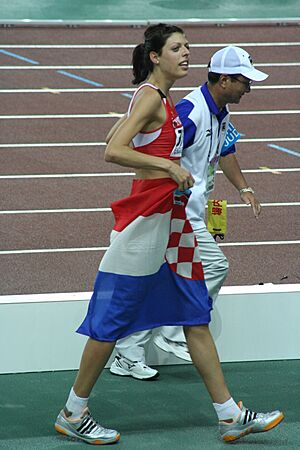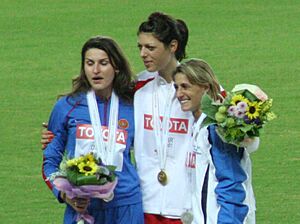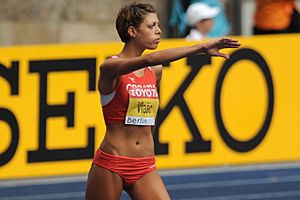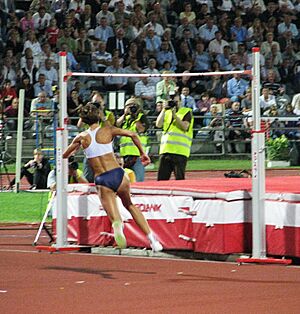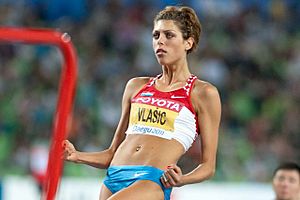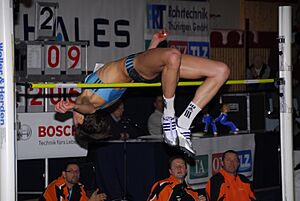Blanka Vlašić facts for kids
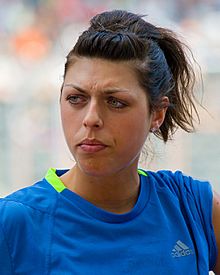
Vlašić in 2008
|
||||||||||||||||||||||||||||||||||||||||||||||||||||||||||||||||||||||||||||||||||||||||||||||||||||||||||||||||||||||||||||||
| Personal information | ||||||||||||||||||||||||||||||||||||||||||||||||||||||||||||||||||||||||||||||||||||||||||||||||||||||||||||||||||||||||||||||
|---|---|---|---|---|---|---|---|---|---|---|---|---|---|---|---|---|---|---|---|---|---|---|---|---|---|---|---|---|---|---|---|---|---|---|---|---|---|---|---|---|---|---|---|---|---|---|---|---|---|---|---|---|---|---|---|---|---|---|---|---|---|---|---|---|---|---|---|---|---|---|---|---|---|---|---|---|---|---|---|---|---|---|---|---|---|---|---|---|---|---|---|---|---|---|---|---|---|---|---|---|---|---|---|---|---|---|---|---|---|---|---|---|---|---|---|---|---|---|---|---|---|---|---|---|---|---|
| Nationality | Croatian | |||||||||||||||||||||||||||||||||||||||||||||||||||||||||||||||||||||||||||||||||||||||||||||||||||||||||||||||||||||||||||||
| Born | 8 November 1983 Split, SR Croatia, Yugoslavia |
|||||||||||||||||||||||||||||||||||||||||||||||||||||||||||||||||||||||||||||||||||||||||||||||||||||||||||||||||||||||||||||
| Height | 1.93 m (6 ft 4 in) | |||||||||||||||||||||||||||||||||||||||||||||||||||||||||||||||||||||||||||||||||||||||||||||||||||||||||||||||||||||||||||||
| Weight | 70 kilograms (154 lb) | |||||||||||||||||||||||||||||||||||||||||||||||||||||||||||||||||||||||||||||||||||||||||||||||||||||||||||||||||||||||||||||
| Sport | ||||||||||||||||||||||||||||||||||||||||||||||||||||||||||||||||||||||||||||||||||||||||||||||||||||||||||||||||||||||||||||||
| Country | Croatia | |||||||||||||||||||||||||||||||||||||||||||||||||||||||||||||||||||||||||||||||||||||||||||||||||||||||||||||||||||||||||||||
| Sport | Athletics | |||||||||||||||||||||||||||||||||||||||||||||||||||||||||||||||||||||||||||||||||||||||||||||||||||||||||||||||||||||||||||||
| Event(s) | High jump | |||||||||||||||||||||||||||||||||||||||||||||||||||||||||||||||||||||||||||||||||||||||||||||||||||||||||||||||||||||||||||||
| Coached by | Joško Vlašić Bojan Marinović |
|||||||||||||||||||||||||||||||||||||||||||||||||||||||||||||||||||||||||||||||||||||||||||||||||||||||||||||||||||||||||||||
| Achievements and titles | ||||||||||||||||||||||||||||||||||||||||||||||||||||||||||||||||||||||||||||||||||||||||||||||||||||||||||||||||||||||||||||||
| World finals | 1st (2007 Osaka) 1st (2009 Berlin) |
|||||||||||||||||||||||||||||||||||||||||||||||||||||||||||||||||||||||||||||||||||||||||||||||||||||||||||||||||||||||||||||
| Olympic finals | 2nd (2008 Beijing) 3rd (2016 Rio de Janeiro) |
|||||||||||||||||||||||||||||||||||||||||||||||||||||||||||||||||||||||||||||||||||||||||||||||||||||||||||||||||||||||||||||
| Personal best(s) | 2.08 m NR (Zagreb 2009) Indoors 2.06 m NR (Arnstadt 2010) |
|||||||||||||||||||||||||||||||||||||||||||||||||||||||||||||||||||||||||||||||||||||||||||||||||||||||||||||||||||||||||||||
|
Medal record
|
||||||||||||||||||||||||||||||||||||||||||||||||||||||||||||||||||||||||||||||||||||||||||||||||||||||||||||||||||||||||||||||
| Updated on 29 July 2017. | ||||||||||||||||||||||||||||||||||||||||||||||||||||||||||||||||||||||||||||||||||||||||||||||||||||||||||||||||||||||||||||||
Blanka Vlašić (born November 8, 1983) is a Croatian athlete who used to compete in the high jump. She is known for being a two-time world champion and an indoor world champion. Blanka also won two Olympic medals. Her personal best jump of 2.08 meters is a Croatian record and one of the highest jumps ever recorded.
Blanka's father, Joško Vlašić, was also a famous athlete in decathlon. Blanka started her career as a talented young athlete. She went to her first Olympic Games in Sydney when she was just sixteen. She won the World Junior Championships in Athletics twice, in 2000 and 2002.
In 2004, Blanka broke the Croatian national record. She also won her first senior medal at the World Indoor Championships that year. A health issue called hyperthyroid affected her performance at the Athens Olympics. She spent 2005 recovering from surgery.
She returned to competition in 2006 and won a silver medal at the World Indoor Championships. The year 2007 was very successful for her. She won the World Championships and became the indoor world champion in 2008. Her winning streak ended with a close loss at the Beijing Olympics, where she won a silver medal. She became World Champion for the second time in 2009. Blanka also received awards like the IAAF World Athlete of the Year in 2010 and the European Athlete of the Year trophy in 2007 and 2010.
Contents
- Blanka's Early Life and Career
- Blanka's Achievements
- Blanka's Personal Life
- See also
Blanka's Early Life and Career
Growing Up with Sports
Blanka Vlašić was born on November 8, 1983, in Split, Croatia. She was involved in sports from a very young age. Her mother, Venera, was a good amateur in basketball and cross-country skiing. Her father, Joško Vlašić, was an international athlete who held the Croatian record in the decathlon.
Blanka's father often took her to the track when he practiced. She first dreamed of becoming a sprinter. As she grew, she tried many sports. She found that the high jump was perfect for her tall and slim body. Blanka preferred individual sports because of the excitement they offered. She quickly became a top high jumper, clearing 1.80 meters at fifteen and 1.93 meters at sixteen.
Starting International Competitions
Blanka started competing internationally very early. She took part in the first World Youth Championships, finishing eighth. She also represented Croatia at the 2000 Sydney Olympics. Even though she wasn't ready for senior-level competition at the Olympics, she showed her talent by winning the 2000 World Junior Championships with a jump of 1.91 meters.
She kept improving and qualified for more top senior events. Blanka finished sixth at the 2001 World Championships in Edmonton with a jump of 1.94 meters. This result made experts see her as a future star. She ended that year by winning her first senior gold medal at the 2001 Mediterranean Games.
Success as a Junior Athlete
In her last year as a junior, Blanka continued to develop as a high jumper. She set a new indoor best of 1.92 meters at the 2002 European Indoor Championships. She was expected to win the 2002 World Juniors. She won the competition by a large margin, jumping 1.96 meters, a new personal best. She even tried to clear the two-meter mark.
Even though she didn't clear two meters, she was happy with her win. She said that winning the gold was what mattered most. At the European Championships, she finished fifth. Still, by the end of the year, she was ranked among the top ten high jumpers in the world.
Becoming a Top Contender
The 2003 athletics season started well for Blanka. She set a new personal best of 1.98 meters in Linz. Ten days later, she finished fourth at the World Indoor Championships, her best finish at a major world event so far. In June and July, she improved even more, jumping 1.98 meters again and then 1.99 meters to win her first IAAF Golden League event.
Days later, she jumped two meters for the first time in her home country at the IAAF Grand Prix Zagreb. This was a big moment for her. Blanka won gold at the 2003 European Athletics Under-23 Championships. She then improved her best by another centimeter, reaching 2.01 meters. This qualified her for the World Championships and the first IAAF World Athletics Final.
Her season ended with no medals at the World Championships (seventh place) or the Athletics Final (fourth place). Despite this, only three athletes jumped higher than her best of 2.01 meters in 2003.
National Record and Health Challenges
Blanka started 2004 well, winning a bronze medal at the 2004 IAAF World Indoor Championships. She often finished on the podium during the outdoor season and won the 2004 national championships. A Croatian record-breaking jump of 2.03 meters in Ljubljana made her ready for the 2004 Athens Olympics.
However, at the Olympic high jump final, she only managed eleventh place with 1.89 meters. After this, Blanka didn't compete for almost a year. She felt very tired and was diagnosed with a hyperthyroid condition, which affects the thyroid gland.
Surgery and recovery meant she missed most of the 2005 season. She only competed twice. She won the national championships with 1.95 meters, but her jump of 1.88 meters was not enough to reach the finals of the 2005 World Championships.
Even though her health problems affected her medal chances in 2004 and 2005, Blanka returned strong in 2006. She improved her indoor best to 2.05 meters (a national record) in February. She then won silver at the 2006 IAAF World Indoor Championships. She was happy with her performance, especially after being in the hospital a year before.
At the 2006 European Athletics Championships in Gothenburg, she cleared 2.01 meters but finished fourth. This was the highest jump ever for a non-medal winner. She ended the season at the 2006 World Athletics Final, finishing sixth.
2007: Becoming a World Champion
Blanka had a strong indoor season in 2007, jumping 2.01 meters in February. However, she finished fifth at the 2007 European Athletics Indoor Championships (later moved to fourth).
In the 2007 outdoor season, Blanka won eighteen out of nineteen competitions. Her only loss was early in the season at a Golden League meeting in Oslo. Blanka won the World Championships in Osaka with a 2.05 meter jump. This was Croatia's first gold medal at the World Athletics Championships.
In October, Blanka was named female European Athlete of the Year. This was a big honor, making her the first Croatian athlete and first high jumper to win this award.
2008: Olympic Silver Medal
World Indoor Title
In March 2008, Blanka won her first world indoor title in Valencia, Spain, with a jump of 2.03 meters. Ten days earlier, she had set an indoor national record of 2.05 meters.
Before the 2008 Summer Olympics in Beijing, Blanka had jumped over 2.00 meters twelve times outdoors. She led the world rankings with a jump of 2.06 meters, three centimeters higher than her closest rivals.
Beijing Olympics Performance
At the Olympics, Blanka cleared every height on her first try, from 1.89 meters to 2.03 meters. At 2.03 meters, Blanka, Anna Chicherova, and Tia Hellebaut were still in the competition. The bar was raised to 2.05 meters. Blanka missed her first attempt, while Hellebaut broke the Belgian record. Blanka cleared the bar on her second jump. However, she lost the gold medal to Hellebaut because Hellebaut had fewer misses at earlier heights. Neither athlete cleared 2.07 meters.
Blanka's season ended when she was again beaten in a tie-breaker at the final event of the ÅF Golden League series. This meant she missed out on winning the $1,000,000 jackpot. She had won the previous five Golden League events but finished second at the Memorial Van Damme meeting.
2009: Second World Title and Personal Best
In the 2009 indoor season, Blanka jumped 2.05 meters in Karlsruhe, matching her own national indoor record. However, she did not win a medal at the 2009 European Indoor Athletics Championships in Torino, finishing fifth.
At the World Championships, Blanka competed against Ariane Friedrich. Anna Chicherova also joined them in the final, taking the lead with a 2.02 meter jump on her first try. Blanka cleared it on her second attempt. At 2.04 meters, Blanka was the first to clear it. She then tried to set a new world record by raising the bar to 2.10 meters, but she did not clear it.
On August 31, at the Hanžeković Memorial in Zagreb, Blanka cleared 2.08 meters. This was a new personal best and a Croatian record. It made her the second-best high jumper of all time, just behind the world record of Stefka Kostadinova (2.09 meters in 1987). She tried for 2.10 meters again but did not succeed.
2010: World Indoor and European Titles
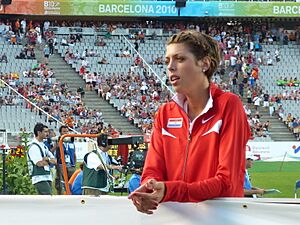
On February 6, 2010, Blanka jumped 2.06 meters in Arnstadt, Germany. This jump added one centimeter to her personal best and Croatian record. It also placed her third on the all-time indoor lists. A month later, she won her second world indoor title in Doha with 2.00 meters.
During the outdoor season, she won the first IAAF Diamond League series by winning seven events. She cleared 2.00 meters in six of these seven events.
On August 1, 2010, Blanka won her first European title with 2.03 meters. This jump matched the championship record. She beat Emma Green (silver) and Ariane Friedrich (bronze), who both jumped 2.01 meters.
Blanka was chosen to represent Europe at the 2010 IAAF Continental Cup in her hometown of Split. She won the event with 2.05 meters. She tried to break the world record at 2.10 meters but did not succeed.
At the end of the year, Blanka was named European Athlete and IAAF World Athlete of the year.
2011 Season: Another World Medal
Leading up to the 2011 World Championships in Daegu, Blanka was not the top favorite. Her rival Anna Chicherova had jumped 2.07 meters, a Russian record. Blanka also had a left leg injury, making her participation uncertain.
However, at the championships, she performed very well. She cleared 2.03 meters and won a silver medal. She came close to clearing 2.05 meters, which would have made her the first high jumper to win three world titles in a row. But Anna Chicherova won the gold due to fewer misses.
2012-2013: Dealing with Injuries
Blanka had surgery on her left Achilles tendon in January 2012. The operation seemed successful, but an infection developed, requiring another surgery in April. Her slow recovery meant she missed the London Olympics. She did not compete at all in 2012.
After 20 months, Blanka returned to competition on May 25 in New York. She won with a jump of 1.94 meters. She then jumped 1.95 meters in Rome and 2 meters in Buhl in June. She was working to strengthen her ankle for the 2013 Moscow World Championships. Sadly, she had to withdraw from the championships because she was not fully recovered.
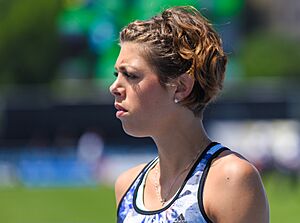
2015 World Championships Return
In March 2014, Blanka returned to international championships at the 2014 IAAF World Indoor Championships. She finished sixth with 1.94 meters. Due to a jumper's knee injury in her left knee, she had to miss the 2014 European Athletics Championships in Zürich.
However, she returned a week later at the Weltklasse Zürich and placed fourth with 1.93 meters. She ended her season well, jumping that height again in Zagreb.
In 2015, Blanka started her outdoor season at the Golden Gala in Rome. She placed second with 1.97 meters. She matched that height in New York City, again finishing second. Because of ongoing foot pain, she canceled her appearances in Lausanne and Monaco to prepare for the Beijing World Championships.
The World Championships in Beijing were Blanka's first major outdoor championship since 2011. On August 27, she reached the finals. Two days later, she won the silver medal, finishing behind Mariya Lasitskene. For Blanka, this silver medal felt like gold, especially after all the challenges she had faced with injuries.
2016: Olympic Bronze Medal
Still dealing with her Achilles problem, Blanka only competed once in 2016. This was in Split on January 29, where she won with 1.95 meters. This jump met the qualifying standard for the 2016 Summer Olympics. On February 3, she had surgery in Turku, Finland. Even though she didn't compete during the outdoor season, she was chosen to represent Croatia at the Olympics.
Olympic Competition in Rio
On August 18, Blanka competed in the Women's high jump qualification and reached the finals by clearing 1.94 meters. Two days later, in the final, she cleared 1.88 meters and 1.93 meters on her second try, then 1.97 meters. She, Ruth Beitia, Mirela Demireva, and Chaunté Lowe were the only athletes to clear that height.
Blanka was in third place. She tried to clear 2.00 meters but failed all three attempts. Since no one else cleared it, she won the bronze medal. This was the first time since the 1980 Summer Olympics that the winning height was below 2.00 meters. Blanka became the seventh female athlete in high jump history to win two Olympic medals. She later donated her medal to a Croatian shrine.
After the Olympics
On July 19, 2017, Blanka announced she would not compete at the 2017 IAAF World Championships in London due to foot pain. She said she did not plan to retire yet and hoped to return for the 2018 season, aiming for the 2020 Summer Olympics in Tokyo.
However, on February 19, 2021, Blanka Vlašić officially announced her retirement from athletics.
Blanka's Achievements
Personal Best Jumps
| Event | Mark | Venue | Date | |
|---|---|---|---|---|
| High jump | Outdoor | 2.08 m NR | Zagreb, Croatia | 31 August 2009 |
| Indoor | 2.06 m NR | Arnstadt, Germany | 6 February 2010 | |
International Competition Results
| Year | Competition | Venue | Position | Notes |
|---|---|---|---|---|
| 2000 | World Junior Championships | Santiago, Chile | 1st | 1.91 m |
| 2001 | World Championships | Edmonton, Canada | 6th | 1.94 m |
| Mediterranean Games | Tunis, Tunisia | 1st | 1.90 m | |
| 2002 | World Junior Championships | Kingston, Jamaica | 1st | 1.96 m |
| European Championships | Munich, Germany | 5th | 1.89 m | |
| 2003 | World Indoor Championships | Birmingham, United Kingdom | 4th | 1.96 m |
| European U23 Championships | Bydgoszcz, Poland | 1st | 1.98 m | |
| World Championships | Paris, France | 7th | 1.95 m | |
| World Athletics Final | Monte Carlo, Monaco | 4th | 1.96 m | |
| 2004 | World Indoor Championships | Budapest, Hungary | 3rd | 1.97 m |
| Olympic Games | Athens, Greece | 11th | 1.89 m | |
| 2006 | World Indoor Championships | Moscow, Russia | 2nd | 2.00 m |
| European Championships | Gothenburg, Sweden | 4th | 2.01 m | |
| World Athletics Final | Stuttgart, Germany | 6th | 1.90 m | |
| 2007 | European Indoor Championships | Birmingham, United Kingdom | 4th | 1.92 m |
| World Championships | Osaka, Japan | 1st | 2.05 m | |
| World Athletics Final | Stuttgart, Germany | 1st | 2.00 m | |
| 2008 | World Indoor Championships | Valencia, Spain | 1st | 2.03 m |
| Olympic Games | Beijing, China | 2nd | 2.05 m | |
| World Athletics Final | Stuttgart, Germany | 1st | 2.01 m | |
| 2009 | World Championships | Berlin, Germany | 1st | 2.04 m |
| World Athletics Final | Thessaloniki, Greece | 1st | 2.04 m | |
| 2010 | World Indoor Championships | Doha, Qatar | 1st | 2.00 m |
| European Championships | Barcelona, Spain | 1st | 2.03 m | |
| Diamond League | 1st | details | ||
| 2011 | World Championships | Daegu, South Korea | 2nd | 2.03 m |
| Diamond League | 1st | details | ||
| 2014 | World Indoor Championships | Sopot, Poland | 6th | 1.94 m |
| Diamond League | 3rd | details | ||
| 2015 | World Championships | Beijing, China | 2nd | 2.01 m |
| 2016 | Olympic Games | Rio de Janeiro, Brazil | 3rd | 1.97 m |
Blanka's Personal Life
Blanka Vlašić was named after Casablanca, a city where her father won a gold medal at the 1983 Mediterranean Games around the time she was born.
From the start of her career, she was coached by her father, Joško Vlašić, and a former high jumper, Bojan Marinović.
Her brother, Nikola Vlašić, is a well-known Croatian football player.
Blanka is a member of the 'Champions for Peace' club. This group includes 54 famous athletes who use sport to promote peace around the world. Blanka is a devoted Roman Catholic.
On May 26, 2022, Blanka Vlašić announced on Instagram that she had married Belgian sports journalist Ruben Van Gucht. She also shared that they were expecting their first child.
See also
 In Spanish: Blanka Vlašić para niños
In Spanish: Blanka Vlašić para niños


